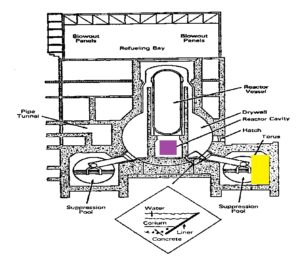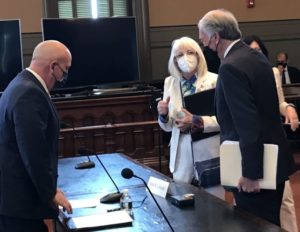PLYMOUTH — The Dept. of Environmental Protection determined last July that the proposed discharge of over one million gallons of radioactive wastewater from the Pilgrim Nuclear Power Station into Cape Cod Bay would violate the state’s Ocean Sanctuaries Act. But in August, Holtec International, the company that bought the Plymouth plant after it shut down to carry out its decommissioning, appealed that decision.
The MassDEP’s Office of Appeals and Dispute Resolution will hold a hearing on the appeal in Boston, beginning on June 12.
The DEP’s denial was based on its finding that while the Ocean Sanctuaries Act, which prohibits such industrial discharges into protected state waters including Cape Cod Bay, does exempt discharges of contaminated wastewater associated with active electric power generation and transmission, Pilgrim would not be exempt because it had not generated electricity since it was permanently shut down in 2019.
Holtec is arguing that its release of the wastewater should be permitted because the contaminated water was involved in the production of electric power.
Meanwhile, local officials, environmental groups, and members of the fishing, tourism, and real estate businesses are working on another front: they want to halt Holtec’s use of submerged heaters to evaporate the contaminated wastewater from the reactor building into the air — a practice they say the company is using to release most of the wastewater over the next several years.
Evaporation Opposition
The amount of contaminated wastewater Holtec says that it seeks to release has dropped from 1.1 million gallons to about 830,000 gallons since the company first announced its plan to release it into the bay in November 2021.
In April 2023, the company filed a request for an amendment to its wastewater discharge permit, but the amount of contaminated water at the plant was meanwhile dropping because of evaporation. As the Independent reported in 2023, the company said that the 200,000-gallon drop in the amount of water at that point had been caused by submersible heaters being used in the reactor cavity to dry out irradiated pieces of the reactor. Holtec also said that the heaters in the pools raised the temperature of the building, making it more comfortable for workers.
Mary Lampert, a member of a coalition of environmental groups and longtime president of Pilgrim Watch, has submitted written testimony and will serve as the witness for the coalition at the upcoming hearing. She characterized it as a “David and Goliath” battle in which Holtec has nothing to lose. That’s because the company can cover its legal costs with money in the decommissioning trust fund, she said — money that was collected from ratepayers during the 25 years the plant was owned by Boston Edison.
Stopping the evaporation is key, Lampert said, because even if the judge agrees with petitioners that DEP was correct not to issue the discharge permit requested by Holtec, with evaporation, “the contaminants go into the bay, endangering public health, safety, and our marine economy.”
The 15 towns in Barnstable County, along with Plymouth, Duxbury, and Scituate, voted in favor of an advisory ballot question this spring that directs town governments to urge Gov. Maura Healey, Attorney General Andrea Campbell, and state legislators to enforce state laws and prohibit Holtec from evaporating Pilgrim’s wastewater.
Diane Turco, director of Cape Downwinders, along with representatives of the Save Our Bay coalition — both advocacy groups working to stop the release of the wastewater — planned to present the results of the advisory votes to the governor’s office on June 10.
Appeal ‘Intervenors’
After Holtec’s appeal of the MassDEP’s decision, six groups that oppose the discharge filed motions to participate in the appeal as “intervenors,” including one led by the Association to Preserve Cape Cod. Another intervenor group included several groups of environmentalists.
In November, the DEP determined that these groups would be allowed to participate in the appeal by submitting written testimony to support their positions. At the upcoming hearing, lawyers for each side will cross-examine the opposing side’s witnesses on their submitted testimony.
The first two days of the hearing will include cross-examination of Holtec’s five witnesses: Russell Parkman and Robin Richards, industrial wastewater management experts with Ramboll Environ; Michael Twomey, a former senior vice president for Entergy Corp, the company that owned Pilgrim until it was shut down in 2019, and currently a senior consultant at Charles River Associates Energy; Steve Walker from Enercon Engineering; and David Noyes, the compliance manager at Pilgrim for Holtec Decommissioning International who was a longtime employee of Entergy Corp.
The intervenor group led by the Association to Preserve Cape Cod (APCC) is made up of members of the Cape Cod Fishermen’s Alliance and others in the fishing industry; Mashpee Wampanoag tribe members; state Sen. Dylan Fernandes; Wellfleet select board member Sheila Lyons, who also serves on the Barnstable County Commission; Rick Sawyer, president of the Aquacultural Research Corp., a shellfish hatchery; Ryan Castle, CEO of the Cape & Islands Association of Realtors; and Paul Niedziewcki, CEO of the Cape Cod Chamber of Commerce.
APCC Executive Director Andrew Gottlieb and board member John Cumbler, who also serves on the Wellfleet Conservation Commission and is knowledgeable about the provisions of the Ocean Sanctuaries Act, filed pre-hearing testimony and are on the list of witnesses to be cross-examined.
Holtec’s contention is that the wastewater is the same water that was used to generate power when the reactor was operating, so its discharge should be exempted under the Ocean Sanctuaries Act.
“What this case is about is whether or not they had an exemption, which we can all see had been terminated,” Gottlieb said. “Disposing of water associated with decommissioning is different from disposing of water associated with the generation of power,” he said. “You’re obviously subject to the act. End of conversation.”
Lealdon Langley, the director of MassDEP’s Div. of Watershed Management, is the agency’s sole witness. Once the hearing concludes, Chief Presiding Officer Salvatore Giorlandino will give his recommendation to DEP Commissioner Bonnie Hieple, who will then rule on the appeal.
If the denial is affirmed, Noyes has already said, the company will continue its appeal in federal court.
Although Noyes has consistently denied the accusation, Gottlieb has said he believes Holtec is stalling with appeals of the permit while evaporating the wastewater into the atmosphere — “without having to protect the surrounding public health. I think their actual plan is to evaporate as much as they can.”


